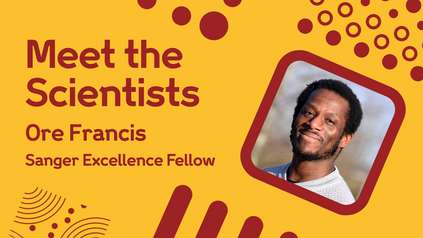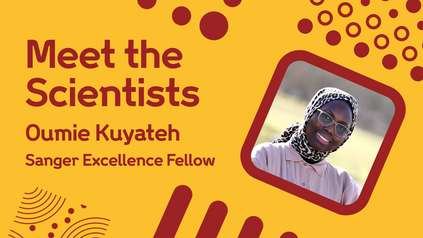Wellcome Sanger Institute appoints Excellence Fellows from Black heritage backgrounds
Sanger Excellence Fellowship
For early-career scientists from Black heritage backgrounds
Four exceptional scientists have started at the Wellcome Sanger Institute as part of the Excellence Postdoctoral Fellowship, across multiple research areas.
This is the second round of the Excellence Postdoctoral Fellowship1 which was launched in December 2021 and designed to support the training and career development of scientists from Black heritage backgrounds.
This year’s four Excellence Fellows are Michael Ansah, Dr Samantha Jumbe, Dr Mona Suleiman and Onalenna Neo.
The Fellowship builds on the Institute’s commitment to promote greater equality, diversity, and inclusion both within the organisation and throughout the wider research community. It recognises that the persistent and damaging racial inequalities that are prevalent in society are mirrored across the research community, and talent, potential and excellence are lost along the academic pipeline due to biases, discrimination and racism.
The Fellowship is an annual offering, accepting at least four Excellence Fellows every year, in partnership with the Medical Research Council2. It provides a fully funded three-year fellowship including targeted mentorship, training and career development opportunities.
This year’s fellows have all joined the Institute in recent months; they will be investigating the genomes of other species found on Earth, discovering new insights about cancer, and finding out more about the parasites and pathogens around us.
Michael Ansah completed his Biochemistry undergraduate degree and his Master’s in Parasitology at Keele University, before achieving his PhD in Biomedical Sciences at the University of Wolverhampton. During the Fellowship, he will be investigating an amoeba species known as Acanthamoeba that is found worldwide. This species can cause an eye condition called Acanthamoeba keratitis, which can lead to blindness, and granulomatous amoebic encephalitis, a rare and often fatal disease impacting the central nervous system. Michael will focus on understanding the genetic diversity and impact of this amoeba species, as well as searching for potential therapeutic targets. His work will hopefully result in improved treatment outcomes for patients.
Onalenna Neo studied Cellular and Molecular medicine as an undergraduate at the University of Bristol before going on to the University of Birmingham for her PhD. Here, she investigated the role of gut microbes on colorectal cancer, as well as looking at what natural compounds reduce the spread of antimicrobial resistance genes. At Sanger, she will be using advanced tools to detect antimicrobial resistance genes in different environments. Her research aims to unravel the drivers and mechanisms behind antimicrobial resistance gene emergence and spread. This work will contribute to improvements in antimicrobial resistance detection and surveillance and uncover insights into fundamental understanding of how antimicrobial resistance evolves.
Dr Samantha Jumbe developed an interest in the role of genetics in human disease and its expanding application in clinical practice during her undergraduate studies. After completing a degree in Applied Biomedical Science she continued her studies at the University of the West of England in Bristol and attained her PhD in Biomedical Science. After this, she joined the NHS completing her training as a Clinical Scientist, specialising in cancer genomics. During her Fellowship, Samantha will investigate the role of somatic mutations in autoimmune conditions, such as lupus and immune -mediated liver disease. There are currently no cures for autoimmune disorders. This genetic understanding could help find biomarkers and develop better therapies.
Dr Mona Suleiman has recently completed her PhD at the University of Bath focusing on the parasitic worm species, Strongyloides, commonly found in tropical and subtropical climates. As an Excellence Fellow, Mona will be developing a new way of identifying parasitic worm infections in both humans and animals, whilst also investigating the mechanisms related to parasite drug resistance. As these types of infections are estimated to infect more than 1.5 billion people globally causing widespread diseases, Mona’s research will enable more effective monitoring and intervention strategies.
The Excellence Fellowship is supported by a wide network of people and institutes throughout the UK who collaboratively helped to co-design and develop this programme, to create a community of support that can be accessed at any point.
Both the successful and unsuccessful applicants are included in the network and have access to mentoring sessions with steering group members to support them as they move forward in their careers.
“We are thrilled to be able to offer the Sanger Excellence Fellowship every year. This opportunity offers training, mentorship, sponsorship, and support to help ensure that Black researchers can achieve their full potential. We recognise that there is still a great deal to do to improve representation at the Sanger Institute and across the UK scientific community. However, we hope that by showing that it is possible to develop a programme that centres the voices of Black academics, and is continually guided by feedback, we can motivate and inspire other organisations to also consider how they can take practical steps to address inequalities in scientific research.”
Dr Saher Ahmed, Head of Equality, Diversity and Inclusion at the Wellcome Sanger Institute
“At the heart of innovation and progress lies diversity, and this fellowship represents a significant step towards fostering greater inclusivity in the research community. We recognise the immense talent, passion, and potential within the Black researcher community, and would like to congratulate this year’s Excellence Fellows. The Sanger Excellence Fellowship has been a pioneering scheme within the UK, and the Medical Research Council is committed to providing resources and support through our Black in Biomedical Research project.”
Dr Sarah Goler Solecki, Equality, Diversity and Inclusion Engagement and Change Manager at the Medical Research Council
“It is vital that we, as individuals and Institutions, work together to address racial inequality and I am pleased that we are partnering with the Medical Research Council for the next three years on this Fellowship. While there is always more to do to address inequality, I am glad that we can provide the Sanger Excellence Fellowship annually. I look forward to working with our wider networks to ensure that the Sanger Institute is a supportive and inclusive environment for all.”
Professor Matthew Hurles, Director of the Wellcome Sanger Institute
Applications for the next round of Sanger Excellence Postdoctoral Fellows have opened. Click here for more information on how to apply to the 2025 Excellence Fellowship.
More information
- The Fellowship is open exclusively to early-stage researchers who have an undergraduate degree and a PhD (or equivalent research experience) awarded from a UK institution and are from a Black heritage background.
- The Medical Research Council (MRC) have funded two Fellows per year for the next three years.
The Fellowship is part of a wider Race Equity Strategy; this includes other initiatives such as reverse mentoring and an anti-racism development programme, in which leaders and staff from across the Sanger Institute are playing active roles. Active evaluation processes will take place on an ongoing basis to inform the direction of the strategy and develop future programmes.
Further reading: The Broken Pipeline – Barriers to Black PHD Students Accessing Research Council Funding. Available here: The Broken Pipeline – Barriers to Black PhD Students Accessing Research Council Funding – Leading Routes
For more information on the Fellowship: https://www.sanger.ac.uk/about/equality-in-science/sanger-excellence-fellowship/
Funding:
The Fellowship includes funding from Wellcome, the Medical Research Council, and had previous funding from Cancer Research UK.





